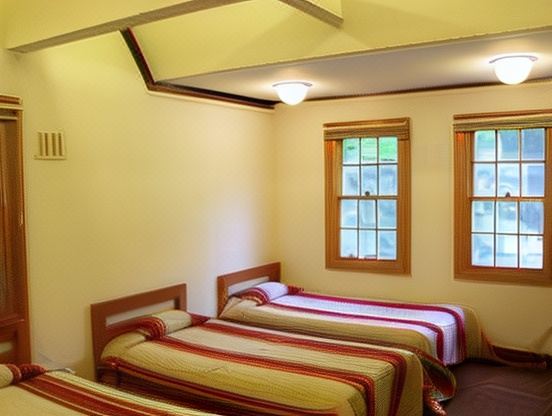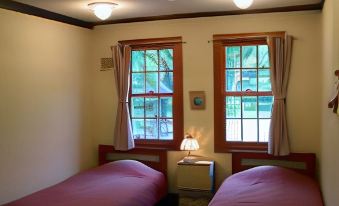Pension Kaza
Select date
-
Select date
1 night
1 room, 2 adults, 0 children
All properties in Nanae
Pension Kaza
Homestay
215 Onuma-cho, 041-1354 Nanae Town, Kameda District, Hokkaido, Japan
Show on map
We Price Match


 Highlights
Highlights Ideal location
Ideal location Sparkling clean
Sparkling clean Excellent service
Excellent serviceProperty Description
This pension, surrounded by the lush nature located on the shores of Lake Onuma, welcomes its guests with a familial sense of hospitality
Show more
8.5/10
Cleanliness9.1
Amenities7.5
Location8.5
Service8.8
All 3 reviews
Surroundings
Airport: Hakodate Airport
(32.7 km)
Train: Onumakoen Station
(170m)
Train: JE Onuma Station
(1.8 km)
Landmarks: Yuhi No Michi
(130m)
Landmarks: Onuma Quasi-National Park
(350m)
View on map
Overview
Rooms
Guest Reviews
Policies

1
Triple Room
3 single beds
Has window
Non-smoking
Check Availability

1
4-Bed Room
4 single beds
Has window
Non-smoking
Check Availability
Guest Reviews
8.5/10
Very Good
3 reviews
 Verified Reviews
Verified Reviews- Cleanliness9.1
- Amenities7.5
- Location8.5
- Service8.8
Average for similar properties in Nanae
Book now and leave a review after your stay to earn up to 120 Trip Coins (approx. TWD 36). Trip Coins can be used to save instantly on room rates.

Guest User
May 6, 2025
這是一家民宿,離開JR大沼公園站很近,過鐵道線就能看到了,主人家態度很好,房間大小還可以,有燒煤油的取暖器,衞生間浴室和盥洗室在外面公用的,不過特別乾淨的,尤其是衞生間,一點異味都沒有,有專門的除臭劑,進門有專用的拖鞋,真佩服主人家。雖然房間裝修一般,但是餐廳值得一看,裝修很有特色,早餐做好後主人家會來每個房間叫你,早餐要記得提前預訂的,一早周圍找不到吃的地方,連鎖店都沒有。
Translate

Guest User
April 29, 2025
天井が高くて良かったです
Translate

Guest User
January 4, 2023

家族旅行で行きました。この値段で2食付きは大満足です。 食堂には自然を使った置物やシカの角の時計などこよなく自然を愛しているのだなと伝わるものがたくさんありました。建物も古いですが何度も手作りでリフォームしてきた跡があります。うちの子は「なんだかスイスに行ったときのコテージみたい」といっていました。スイスアルプスも古いものを手でリフォームしながら手作りと自然を感じられるものだったのを思い出しました。天井が高いのもそう感じた理由かも知れません。 宿ではツアーガイドもしており、オーナーは自然公園指導員(環境省)や自然保護監視員(北海道)でもあり、環境大臣賞など数々の受賞しているだけのことはあるかと感じました。 洗面所、フロ、トイレは共同ですが、シェアハウスみたいで楽しかったです。旅先で顔を合わせたら「こんにちは」「ありがとうございます」とちょっとした一言を交わすのが楽しみです。本来なら、食堂でまったりと見知らぬ人と旅の会話を楽しむべき空間が用意されていたのですが、コロナ禍で遠慮しなければならないのがもどかしかったです。なお、お風呂は一人ずつしか入れないので、車で10分から15分ほどのところにある温泉も紹介していました。 一つだけ問題があるとしたら、部屋に使い捨ての歯ブラシが置いてあったことでしょうか。今年の4月からプラスチック資源循環促進法が施行され、ホテルで無料の歯ブラシを置くのをやめようということになったはずなのに(歯ブラシは正確には特定プラスチック対象製品)、どこのビジネスホテルに行っても置いてあります。海外のホテルに歯ブラシがあった試しはありません。日本の悪しき使い捨て文化です。こういうコテージこそ、率先して使い捨て歯ブラシを置かないという取り組みを率先して実践すると、なおエコ派な宿泊客が来てくれるようになるのではないでしょうか。
Translate
Property Policies
Check-in and Check-out Times
Check-in: after 15:00
Check-out: Before 10:00
Child policies
Children of all ages are welcome at this property.
Additional fees may be charged for children using existing beds. Add the number of children to get a more accurate price.
Cots and Extra Beds
Please contact the hotel for details about cot and extra bed policies.
Property Description
- Number of Rooms: 8
Phone:+81-138-673933
This pension, surrounded by the lush nature located on the shores of Lake Onuma, welcomes its guests with a familial sense of hospitality
Frequently Asked Questions
What are the check-in and check-out times at Pension Kaza?
The check-in time at Pension Kaza is 15:00 and the check-out time is 10:00.What are the check-in and check-out times at Pension Kaza?
How much does it cost to stay at Pension Kaza?
Prices at Pension Kaza are subject to change according to dates, hotel policy, and other factors. To view prices, please search for the dates you wish to stay at the hotel.How much does it cost to stay at Pension Kaza?
Which airport is closest to Pension Kaza?
Hakodate Airport is the closest airport to Pension Kaza, and it is about 34 mins from hotel by car (32.7 km).Which airport is closest to Pension Kaza?
What is the cancellation policy for Pension Kaza?
The cancellation policy for Pension Kaza varies depending on the type of room and booking conditions.What is the cancellation policy for Pension Kaza?
About This Property
| Nearest Airport | Hakodate Airport |
|---|---|
| Distance to Airport | 32.69KM |
| Nearest Train Station | Onumakoen Station |
| Distance to Train Station | 0.17KM |
| Average Price From | TWD3990 |
| Hotel Star Rating | 2 |